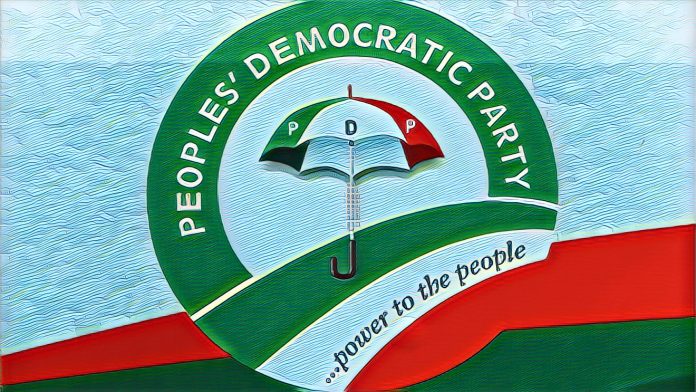Key Points
-
Court halts PDP convention, sparking internal crisis and power struggle.
-
Rival factions suspend top officials amid deepening leadership dispute.
-
Governors and party elders battle for control ahead of 2027 elections.
The Peoples Democratic Party is once again in crisis. A court order, leadership suspensions, and open power struggles have thrown the opposition party into fresh chaos just two years before the 2027 general election.
A Federal High Court in Abuja stopped the Independent National Electoral Commission from recognizing the outcome of the PDP’s planned national convention in Ibadan.
Justice James Omotosho gave the order while ruling on a suit that questioned the legality of the convention.
The decision reopened long-standing divisions inside the party and raised new doubts about its readiness for the next election cycle.
Party leadership rejects ruling
Despite the court order, the PDP leadership said the convention would go on. They called the decision an attack on the party’s right to manage its own affairs.
Soon after, the National Working Committee suspended four top officials — National Secretary Samuel Anyanwu, National Organising Secretary Umar Bature, National Legal Adviser Kamaldeen Ajibade, and Deputy National Legal Adviser Okechukwu Osuoha.
The party said the suspensions were based on “serious constitutional breaches.”
But the crisis only deepened when another group responded by suspending Acting National Chairman Umar Damagum and several others. The move left members divided over who’s actually in charge.
“They can’t form a quorum”
Former presidential aide and PDP chieftain Sani Umar dismissed the counter-suspensions as “illegal and laughable.”
“Fifteen out of nineteen NWC members attended the meeting that made those decisions,” he said. “Four people can’t form a quorum or suspend anyone.”
Umar explained that the PDP constitution allows the committee to suspend members for one month pending review by the disciplinary committee. He said due process was followed.
“I don’t even know where Anyanwu and his people met,” he added. “The legal adviser was out of the country. So how did they meet and suspend the chairman?”
Dispute over the court order
Umar also criticized the Federal High Court’s ruling, calling it a case of “judicial overreach.” He said the judge made an order that even the plaintiffs didn’t ask for.
“The party already issued the required 21-day notice to INEC, but the judge still ordered us to do so,” he said.
“We’ll appeal and ask for a stay of execution. We can’t let one biased ruling derail the convention.”
Allegations of political interference
Umar accused a former governor of working with the ruling All Progressives Congress to destabilize the PDP from within.
“These crises are being fueled by external forces,” he said. “That ex-governor openly supports President Tinubu’s 2027 bid. What he’s doing is pure anti-party behavior.”
He claimed the same group pushing for suspensions wants to use the convention to sideline their rivals without open confrontation.
Governors tighten their grip
A senior party official said the fight isn’t just about the court case or suspensions. It’s about control.
“The governors are the most powerful bloc in the PDP,” the official said. “He who funds the party controls it. Whoever controls the convention controls the future of the party.”
He said the coming months would determine who wins the internal battle — the governors, the NWC, or the older generation of power brokers.
Lamido reappears in the mix
Former Jigawa governor Sule Lamido has resurfaced in the ongoing conflict. Insiders said he’s been meeting with allies of former Rivers governor Nyesom Wike, suggesting a possible new alignment.
“Lamido wasn’t active for a while, but now he’s back,” one source said. “He tried to buy nomination forms at the last minute, claiming he couldn’t get one. It looked more like a political statement than a real bid.”
A party at a crossroads
With lawsuits, suspensions, and rival camps pulling in different directions, the PDP is once again struggling to hold itself together.
Party elders warn that if this chaos continues, the opposition could lose credibility long before voters even head to the polls.
For a party that once dominated Nigerian politics, the challenge now is simple but urgent: to prove it can unite, rebuild trust, and stay relevant in the fight for 2027.



